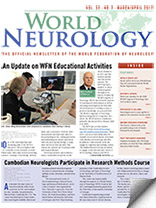Dr. Maouly Fall
Fann Teaching Hospital, Neurology Department of Cheikh Anta Diop University
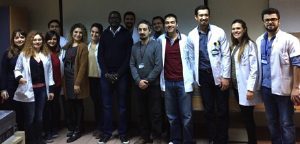
Residents at Gazi University of Ankara.
Many thanks to the Turkish Neurological Society and World Federation of Neurology (WFN) for allowing me to perform this visit to the neurology department of the Gazi University of Ankara from Nov. 15 to Dec. 15, 2016.
My first day in Ankara was devoted to a visit to the city and the headquarters of the Turkish Neurology Society with Burak Tokdemir, manager of the Turkish Neurological Society. The next day was effectively my first day in the neurological department, with Tokdemir, where we first met Prof. Ayşe Bora Tokçaer, the head of the neurology department. After welcoming me, she give me my program, which began with a visit to different parts of the department with Dr. Serhat, a resident in neurology.
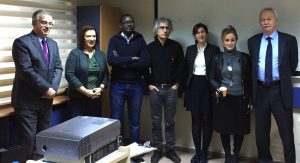
Gazi University staff from left: Prof. Reha Kuruoglu, Prof. Ayşe Bora Tokçaer, Dr. Maouly Fall, Prof. Bulent Cengiz, Dr. Hale Zeynep Caglayan, Prof. Bijen Nazliel, and Prof. Yahya Karaman.
We went to the offices of different professors and associate professors, the outpatient clinic, the inpatient clinic with the intensive unit care, and the EEG and EMG laboratories.
During my visit to the neurology department of Gazi University, I attended several activities, which were important for me and for my practice in Senegal. I participated in the activities of the EMG laboratory observing the basic techniques of nerve conduction, needle EMG with several muscles, which I never seen evaluated before, and single-fiber EMG, which is not available in Senegal. Also, I went to both a standard EEG laboratory and to long-term monitoring video EEG and interpretation, where I acquired many experiences.
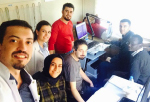
In the EMG laboratory with the EMG team.
I spent each week in the outpatient clinic with different specialties to learn and perform several situations in clinical neurology: headache disorders management, neuromuscular diseases, epilepsy management, multiple sclerosis, Parkinson’s diseases and other movement disorders, and neuro-ophthalmological diseases. I saw many cases of epilepsy, movement disorders, headache, MS, pseudotumor cerebri, as well as many videos and photos. I also participated in some sessions of botulinum toxin injections and apomorphine test, which are not available in Senegal. These activities were helpful and useful to me because since I returned to Senegal my approach and management of patients have improved considerably.
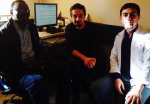
In the EEG laboratory with the EEG team.
I also spent two days of the week in the intensive care unit and inpatient area to see how to manage some rare neurological disorders and emergency cases.
My best experience was the morning of Dec. 7, when I joined the neurosurgery team of Prof. Ayşe Bora Tokçaer and Prof. Tylan Altiparmak to see the operation on a female patient with generalized dystonia. She was operated on for globus pallidus interna DBS. During the operation, I saw how they target the globus pallidus (GPi) and microrecording. I was lucky to attend this surgery session all the more because it was something I had only read about before. It was a great experience.
I also had the opportunity to visit the school of physiotherapy and rehabilitation and talk with physicians about the management of patients in the outpatient and inpatient clinics.
During the last day of my visit, I was invited to talk about neurology in Senegal. I talked about my country, the academic neurological team, the different hospitals and their specialities, the neurological diseases in our setting, how neurology is being practiced, which neurological disorders are common and how we manage them, and with what means. The audience was attentive, and the discussion after was essential.
My experience during this visit was well above my expectations and gave me a broader understanding of the management of neurological disease in our conditions of work in Senegal.
Once again, I thank the Turkish Neurological Society, the WFN, and all the teachers, all the doctors, and all the staff of the neurology department of Gazi University of Ankara. •
